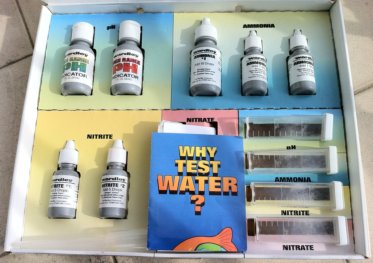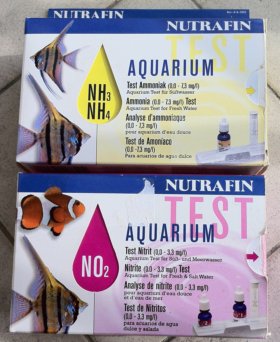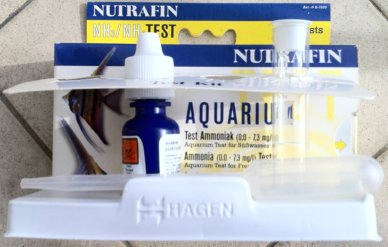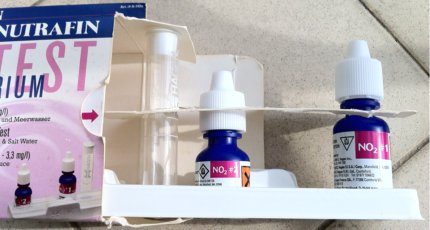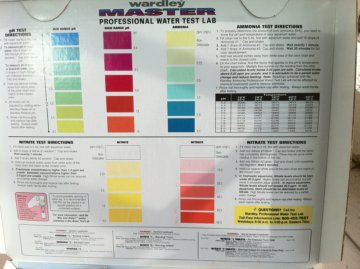|
You didnt think you needed a water testing kit did you? Well think again buddy!
I know, you have kept fish for 20 years, you never once needed a water testing kit and all the while things have been fine. Sure, maybe, you have had 2 or 3 die offs before but hey, that's not too bad for 20 years worth of experience right? WRONG!! Let me tell ya, if you indeed have gone 20 years keeping fish without some sort of water testing kit or mechanism then you really need to boil it down to one thing, Pretty Awesome Luck! (I said one thing, not one word... hehe) That's right, you have been really lucky. No I am not trying to doubt your ability, I just know the human side of you. Come on! you know if you had 2 fish in your fish tank, you will eventually buy another 2, and then another 2... until you think its enough and then one or two of them dies and then you repeat the cycle or you may buy a bigger fish tank and repeat the cycle again. Lets say you are not that type, you are cool with 2 fish in a huge tank. Nothing will probably happen and you are fine. Again, it 'seems' like you dont need a water testing kit. Or by just sheer fluke, you hit the 'ideal fish population' of your aquarium size and again everything is fine and dandy. The true deal is, you will not be able to be sure if things are okay in your fish tank without doing some testing via a water testing kit. Period.
Pet Fish HealthThere are essentially two things that maintains your pet fish health in terms of water quality: is things you can see, such as fish muck which gets filtered out by your filtration system, or some sorta parasite clinging to your fish - which means you need to get it some medication! (which if your filter media is good and maintained and you have good discipline when introducing things into your fish tank, should not be an issue)
are things you cannot see with the naked eye. Na-ah. These things require a water testing kit and they include: 1) Ammonia 2) Nitrite 3) Nitrate 4) Water PH The above 4 are pretty good for a freshwater fish tank. Seawater fish tanks look for even more stuff.
So whats the big deal right you are asking? Dint you say that with the correct layering of filter media, all this gets taken care of? Well it sure does but here's the deal. Depending on how many fish you have in your fish tank, how big they are, how good your filtration system is, how big your fish tank is, these values can get pretty messed up pretty fast and your fish might get nuts on you and possibly die without you really understanding what hit you! (the water can be crystal clear and no indication whatsoever, at least to the naked eye, as to the cause). I am not ashamed to admit, there was a time when I was convinced a part of my house had 'something' there because the fish never lasted more than a few weeks. It was like hocus-pocus, the fish got scared to death! (hmmm... I wonder if that's what you think too??) Where does the water testing kit fit in?So how does the water testing kit fit into all of this then you ask? Well firstly, you need to understand one simple point. The smaller the fish tank.....the harder it is to maintain its water quality. (Bet you thought I was going to say the smaller the fish you keep in them right? :) ) The simple logic? Any fish you put in there, even 1, has less water for it to 'concentrate its crap in', forgive my French, and so it gets 'crapped out' way faster than if it was in a bigger fish tank. Essentially, a small fish tank gets filled with fish doo doo faster. No matter how good the filter, the conversion from ammonia->nitrite->nitrate never really catches up and the fish will drown in its own pile of excrement. Literally. Interestingly, you cant see jack sh*t! (I just love all these puns! :) ) The second point is (now that you know all those 'cheap packages' at the pet store of 'small fish tanks' should be thought over again) that the water testing kit will allow you to know how fast your water quality gets reduced and how fast your good bacteria in your filter is working. This in turn will tell you, how often you may need to do water changes and perhaps even do filter media changes. Using your Water Testing KitHow do we use it? Well lets take a scenario. Lets say you have decided to keep 10 fish in your fish tank (which is not too small). what you can do is: a) test for ammonia, nitrite and nitrate every few days and note the difference. b) determine if your filtration system is doing a good job (basically over time, you should see that ammonia is being converted to nitrite, and nitrites are being converted to nitrates) c) Initially, you should see that the level of ammonia is high, this will be followed by a reduction of ammonia and higher nitrite and in turn a reduction in nitrite and higher nitrates. Essentially a water testing kit will be able to show you whether or not you have a stable filtration system.
A good and mature system will tend to have low ammonia, low nitrite and higher nitrates. So why are the first 2 low? Well it means the good bacteria in your aquarium are doing their work. The third item will be high and can really only be removed via water changes (aquarium plants can help as well but that has its own set of concerns). Depending on the type of fish, high nitrates are tolerated. The key point of all this is that the water testing kit allows you to understand whether or not your filtration system is doing its work and you will also know how often you need to do water changes.
(Basically, when you see low ammonia, low nitrites and very high nitrates, its time to do a water change. Assuming you keep all other factors equal, you will be able to estimate how often to do a water change, for e.g. every 2 weeks or every month, etc.)
These are VERY critical factors for your fish tank health AND I would say impossible without a good water testing kit. And dont worry, the water testing kits should have easy to understand methods of determining the levels of each thing being tested. This is usually done by taking sample aquarium water, mixing it with some chemicals and the resulting stain in color... the deeper the color, the more of that substance there is.
P.S. water PH can be a big deal as well depending on the type of fish you have that may need a more acidic or more alkaline water PH. Most fish are good in and around neutral PH. P.P.S. a little known thing that can happen is that if your filtration system is not optimal, the water can become more acidic and of course makes your fish unhappy. You would need to neutralize the acidity with something alkaline (basic sciences for ya!).
|






